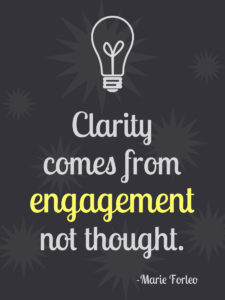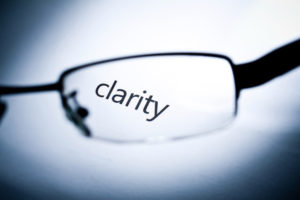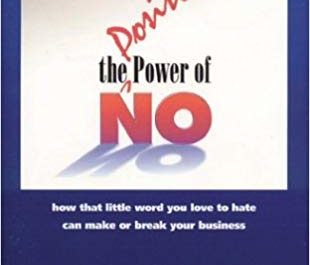 It’s a pretty overused term: clarity. So I thought I’d put my thoughts on my byword in one of these monthly missives. From Dictionary.com:
It’s a pretty overused term: clarity. So I thought I’d put my thoughts on my byword in one of these monthly missives. From Dictionary.com:
Clarity [Kla-ri-tee]
noun
- clearness or lucidity as to perception or understanding; freedom from indistinctness or ambiguity.
- the state or quality of being clear or transparent to the eye; pellucidity: the clarity of pure water.
The second definition above seems to point at the physical condition of transparency (the clearness of pure water). I can see a value just in the idea that it is connected to a condition of transparency. Dictionary.com also then offers many definitions of “transparent.” The top one is the common-use explanation of transmitting light rays through a substance. The one commonly used in the realm of communications is “open; frank; candid.” So I’m totally OK with this second definition of clarity (above).
The first definition of clarity, ending in “freedom from indistinctness or ambiguity,” just hits the nail on the head with me.
How can I make a statement of any kind and ensure clarity?
Simply stated, I can issue the words without attaching any of my personal knower/judger (K/J) filters (judgments, prejudices, agendas, etc.), in hopes that you hear them and not apply any of your K/J filters.
You might think this is easy.
I can make a statement I deem to be factual, such as “That’s a beautiful blue shirt.”
Innocuous enough, right?
Your K/J interpretation of what you’re looking at could cause me a clarity problem.
- You could hate the color and disagree with me, or
- You could see the color as aqua, not blue, or
- Hell, you could even see the piece of clothing as a jacket rather than a shirt!
That one simple five-word sentence can create ambiguity on three different levels.
Now put this K/J disconnect to work in real contemporary conversations and you can begin to see how difficult it can be to assure clarity in even the simplest exchanges, especially meaningful leader/follower discussions where both parties might be actively trying to get clear.
Consider the case where both parties agree (subconsciously, not necessarily pre-agreed) that it IS a shirt, it IS blue, and it IS beautiful. We have no ambiguity. We both see the data though the same K/J filters. We have mutual understanding.
Now consider that you report to me in the company pecking order, you like your job and are hoping to get a raise at the next review, AND you don’t think the shirt is particularly attractive. Certainly not beautiful! But it is a shirt and it is blue. Are you going to push for clarity when, by my words, you now know that I consider it beautiful? Ambiguity increases. Clarity decreases. Again, think about how these K/J filters work to fuzzy up the multi-faceted conversation we have every day.
I’ve found a good tool for combating this in the never-ending struggle for clarity in my world is Steven Covey’s 5th Habit. “Seek first to understand, then to be understood.”
One change I can make is to refrain as much as possible from making declaratory statements… until I’ve tested and probed for the other person’s K/J filters.
“What do you think about what that guy’s wearing?”
“It’s an ugly, aqua-colored jacket,” you might respond. Notice that the response doesn’t necessarily take personal K/J credit for the judgments but declares it as an understood fact.
I now have three choices.
- I can tell you I agree (because for the sake of our relationship, mission at hand, etc., it’s not worth challenging it.)
- I can tell you, “Wow, I think that you and I disagree. I think it’s a beautiful blue shirt.” (I’m not butting heads with you, but I’m owning my judgment).
- I can argumentatively declare (universally) that “That IS a beautiful blue shirt.” And we now have a full-blown disagreement on all three levels.
I strongly believe from my work and my experiences (not declaring these things as a universal truth) that by seeking first to be understood and not expressing my opinions and judgments as universal truths (but still owning them), I can move the needle toward clarity in just about every conversation in which I’m involved.
And that (for me) just delivers a more satisfying existence.



